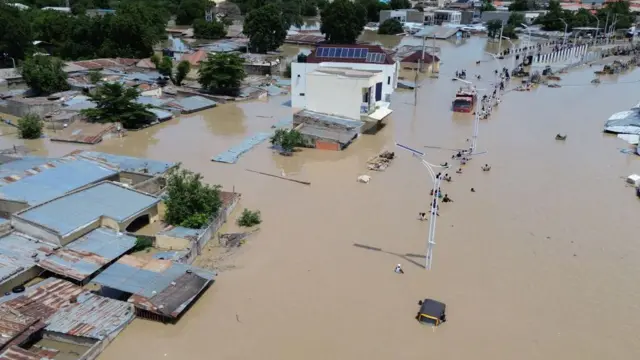Conference of Speakers of Pan-African Parliament (PAP) under the African Union (AU) has declared solidarity with the victims of flood disaster in Nigeria and others affected by similar tragedy on the African continent.
The Conference expressed their sympathy and support in a statement signed by the President of Pan- African Parliament (PAP), Hon. Chief Fortune Zephania Charumbira at the ongoing 12th Annual Conference of Speakers of National and Regional Parliaments at the Pan-African Parliament (PAP) of the African Union (AU) in Midrand, South Africa on Friday.
The Conference stated that the floods in Nigeria and other parts of the continent have highlighted the urgent need for a comprehensive response to natural disasters, driven by climate change and inadequate infrastructure.
It will be recalled that three Nigerian States of Borno, Adamawa and Yobe were recently hit by the natural disaster that reportedly displaced over one million persons with tens of thousands of families without shelter, food, water and access to healthcare.
It will also be recalled that the Nigeria’s House of Representatives Deputy Speaker, Rt. Hon. Benjamin Okezie Kalu who led the Nigerian delegation to the Conference at various sessions repeatedly called the attention of the Conference to the tragedy in Nigeria.
The Conference in their statement called on the respective African governments and the international community to provide immediate assistance to people of the affected areas.
The Speakers also said their solidarity must translate into concrete actions that prioritize human dignity and resilience in the face of adversity.

The statement reads thus: “We, the Speakers of the African Parliaments, convened at this important conference, express our profound solidarity with the people of Nigeria and all victims of flooding across the African continent. Recent catastrophic floods have caused widespread devastation, resulting in loss of lives, displacement of communities, and significant destruction of infrastructure. It is our collective responsibility to stand with those affected and address the underlying challenges that exacerbate these crises.
“The floods in Nigeria and other regions have highlighted the urgent need for a comprehensive response to natural disasters, driven by climate change and inadequate infrastructure. As representatives of our nations, we acknowledge the impact of these events on food security, health, and overall socio-economic stability. We recognize that the consequences of such disasters extend beyond immediate relief, affecting generations to come.
“In light of these challenges, we call upon our governments and the international community to take decisive actions, including: Immediate Humanitarian Assistance: We urge all stakeholders to prioritize the provision of immediate humanitarian aid to flood victims. This includes food, medical supplies, shelter, and psychological support for those affected by these disasters.
“Strengthening Disaster Preparedness: It is imperative that we invest in disaster risk reduction and management strategies. This involves enhancing our infrastructure, improving early warning systems, and developing comprehensive response plans to mitigate the impact of future disasters.
“Promoting Climate Resilience: We must work together to address the root causes of climate change. This includes promoting sustainable land management practices, investing in renewable energy, and ensuring that our development strategies are environmentally sound and resilient to climate impacts.
“Facilitating Regional Cooperation: We call for increased collaboration among African nations to share best practices, resources, and knowledge in managing flood risks and responding to humanitarian crises. Solidarity and unity are essential in facing these challenges collectively.
“Advocating for Long-term Solutions: We must engage in policy dialogue to tackle the systemic issues that lead to vulnerability among communities. This includes addressing poverty, inequality, and lack of access to essential services, which hinder our ability to respond effectively to disasters.
“Strengthening Community Engagement: We recognize the importance of involving local communities in disaster planning and response efforts. Their knowledge and experiences are vital in developing effective strategies tailored to their specific needs.
“In conclusion, we stand united in our commitment to support the people of Nigeria and all flood victims across Africa. Our solidarity must translate into concrete actions that prioritize human dignity and resilience in the face of adversity. Together, we can build a more resilient Africa, capable of weathering the storms of climate change and ensuring a better future for all its citizens”.

